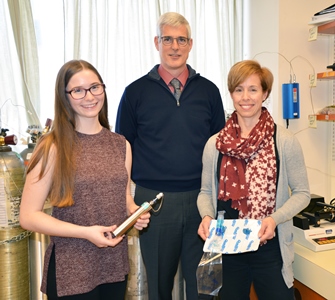Newsroom
Dr. Guy Trudel, lead investigator for a Canadian study on bone marrow, teams up with astronauts on the ISS to uncover the implications of deep space exploration
April 11, 2018

The fifth batch of research equipment for Dr. Guy Trudel’s MARROW study is headed for the stars on April 2. It will be among vital supplies and new experiments being delivered to the International Space Station (ISS) on board the SpaceX Dragon.
The MARROW (bone Marrow Adipose Reaction: Red Or White?) study, a collaboration with the Canadian Space Agency, is investigating the effects of microgravity on the bone marrow of astronauts. As lead investigator, Dr. Trudel – a uOttawa professor and clinician at The Ottawa Hospital – hopes to shed light on what might happen to the human body during deep space exploration, such as a manned mission to Mars.
“Based on experiments done on Earth that mimic an astronaut’s situation in outer space with redirected gravity, such as studies on long-term bed rest, we know that fat accumulates in bone marrow during prolonged sedentary conditions,” says Dr. Trudel. “This fat accumulation has shown to be irreversible and may inhibit the production of red and white blood cells.”
Beginning in 2015, the MARROW study will see the participation of 14 astronauts over five years. Each astronaut submits blood and breath samples before flight, collects his or her own blood and breath samples while on the ISS using specialized equipment, and submits to further testing after returning to earth.
“These resupply missions to the ISS are a cornerstone of our study,” says Dr. Trudel. “We send cannisters and blood tubes up to the astronauts on the ISS for them to collect samples in that microgravity environment and the samples are sent back to earth when a SpaceX Dragon capsule returns.”
Dr. Trudel’s team has received four SpaceX Dragon deliveries of samples from the ISS over the last three years and the April 2 launch will restock the ISS with enough supplies for the upcoming astronauts taking part in MARROW to carry out their sample collections.
The MARROW project has had incredible success with the supplies they’ve received from the ISS, reports Dr. Trudel. So far, the vast majority of returned blood tubes and cannisters have arrived back on Earth and later delivered to our laboratories at the University of Ottawa intact; containing blood and breath samples of high quality, giving precise results.
“MARROW is often the first experiment that an astronaut will do upon arriving at the ISS because we need to know right away how space is effecting their bodies and blood cell counts,” says Dr. Trudel. “So, often in their first report back to earth, you’ll hear them say: ‘Today, I am starting with the MARROW experiment from Canada.’”
The bone marrow is a vital organ since all blood cells are produced by marrow. Without it working properly and producing enough blood cell counts, humans can die. That’s why the MARROW study is crucial to understanding how to prevent or reverse space anemia and degradation in blood cell count.
“We know that the next step in space science is deep space exploration,” says Dr. Trudel. “Currently, manned space missions are six months long, but eventually there’s hope to man missions in space that are a year, two years, even three years long. Because of this dream, we need to understand what happens to bone marrow in space.”
The Ottawa Hospital: Inspired by research. Driven by compassion
The Ottawa Hospital is one of Canada’s largest learning and research hospitals with over 1,100 beds, approximately 12,000 staff and an annual budget of over $1.2 billion. Our focus on research and learning helps us develop new and innovative ways to treat patients and improve care. As a multi-campus hospital, affiliated with the University of Ottawa, we deliver specialized care to the Eastern Ontario region, but our techniques and research discoveries are adopted around the world. We engage the community at all levels to support our vision for better patient care. See www.ohri.ca for more information about research at The Ottawa Hospital.
University of Ottawa: —A crossroads of cultures and ideas
The University of Ottawa is home to over 50,000 students, faculty and staff, who live, work and study in both French and English. Our campus is a crossroads of cultures and ideas, where bold minds come together to inspire game-changing ideas. We are one of Canada’s top 10 research universities—our professors and researchers explore new approaches to today’s challenges. One of a handful of Canadian universities ranked among the top 200 in the world, we attract exceptional thinkers and welcome diverse perspectives from across the globe. www.uottawa.ca
Media Contact
Amelia Buchanan
Senior Communication Specialist
Ottawa Hospital Research Institute
Office: 613-798-5555 x 73687
Cell: 613-297-8315
ambuchanan@ohri.ca
